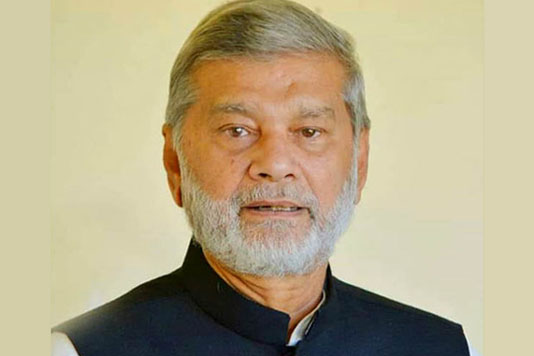DHAKA, Feb 13, 2021 (BSS) – Planning Minister MA Mannan today said that the country is on the right track as huge development works or development works extravaganza is going on in the country which was beyond imagination of people.
“This a matter of our pride, our country is changing fast before our eyes. We’re on the right track,” he said.
The Planning Minister was addressing Energy and Power (EP) talks virtually on “Infrastructural Development: Local Contractors Fall Behind for Lack of Policy Support” as the chief guest.
Distinguished fellow of GCA and special envoy of CVF presidency Abul Kamal Azad and executive director of Policy Research Institute of Bangladesh Dr Ahsan H Mansur spoke as guests of honour.
Former NBR chairman Dr Muhammad Abdul Mazid, former president of FBCCI Mir Nasir Hossain, Additional chief engineer of Roads and Highways Department Shishir Kanti Routh, managing director of Energypac Infrastructure Development Company Ltd Rezwanul Kabeer and contributing editor of EP Khondker Abdus Saleque spoke as panelists.
President of Bangladesh Association of Construction Industry (BACI) and managing director of Dienco Limited SM Khorshed Alam made the key-note presentation at the talks moderated by Editor of EP Mollah Amzad Hossain.
The Planning Minister said the government does not want that the local firms in construction and infrastructural sector fall behind due to policy support, but there are some obligations.
Turning to the issue of delay in project formulation and implementation, Mannan said it is the concerned matter of all including the Prime Minister, but there are also some factors which remain behind the scene.
He mentioned that the government often had to wait for long for getting the nod of the lenders in order to get loan or funding which often delays the project formulation process.
But, the government eventually held responsible for the delay, he noted.
The Planning Minister also assured the stakeholders of the local construction industry that the government wants to help them as well as to stand beside them.
Abul Kalam Azad suggested for exploring the opportunities in the tax structure where support could be provided to the local construction firms.
Noting that there has been a paradigm shift in the infrastructural sector of the country over the years, he recommended for forming a taskforce to make changes in the policies and strategies where those deemed necessary to facilitate the local construction firms.
Dr Ahsan H Mansur said that to properly connect Bangladesh there is a need for building more big bridges like Padma Bridge.
He also suggested for giving due importance on riverbank management, maintaining due quality in road construction, keeping a local firm as a domestic consortium partner in each development project, mobilizing more revenue collection, expediting implementation of PPP projects, ensuring tax neutrality.
The renowned economist said that the local firms should get more works while there should be more locally funded projects. “But, we should be equally concerned with the quality of projects which the government should have to ensure. We must ensure ‘value for money’ of our citizens.”
Former FBCCI President Mir Nasir Hossain, who is also the managing director of Mir Akhter Hossain Ltd, said although the construction industry of Bangladesh has witnessed excellence over the years, but the opportunities are going away. For this, he suggested for giving policy support and domestic price preference to the local construction firms.
Engineer Khorshed Alam in his key-note presentation suggested for cutting dependence on the foreign consultants. If unavoidable, he recommended that instead of firm, company independent consultant may be encouraged on particular issue for technology transfer.
He also came up with the view that a state-owned construction company may also be established with inclusion of the experienced retired engineers from government entity to understand the construction policy loopholes in a better way like India and other countries.



